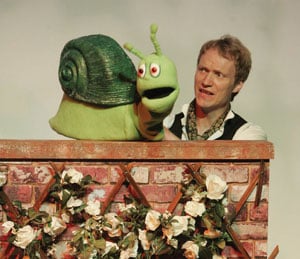Starting young
Environmental awareness is at the heart of the primary curriculum in schools. Ross Harvie explains how Proteus Theatre responded to that

Three years ago Proteus Theatre developed a model for 3–7 year olds that allowed us to tour into schools in the week, and into art centres and theatres at the weekends. Last year we noticed a downturn in school bookings and it soon became clear that our shows, while focusing on moral messages in a fun and interactive way, just weren’t quite hitting the curriculum for key stage 1. One line about saving the polar bears and getting on a bus to school just wasn’t specific enough for headteachers to invest in bringing in the production. What schools really wanted was something that spelt it out, clearly and properly. Of particular importance in summer 2011 was the ‘Living Things’ module that covered everything from eco-systems to healthy eating and the importance of green spaces and the environment.
Mary Swan, Artistic Director for Proteus, dreamt up ‘Sophia and the Snail’. The concept is that Sophia comes from a town; she is visiting Granddad, who has a garden, for the weekend. Sophia loves to play in the garden because she doesn’t have one at home. (Many of Proteus’ tours go into rural communities, so schools wanted us to highlight that having a garden shouldn’t be taken lightly.) The only problem is Sophia is afraid of snails, and Dave the snail needs her help. This was also an opportunity to address childhood phobias. Sophia, in our play went on a journey to overcome her fear of snails. According to online statistics, 11% of children have phobias that carry through to adult life, and this allowed us to explore the thornier issue of fears and why they should be taken seriously in young children – however strange they may seem.
We wanted this production to be as realistic as possible, so we co-produced with Scratchbuilt Productions, who specialise in puppets and masks made out of anything including, in our show, a crow made out of an umbrella. The team came up with the idea of incorporating real herbs that children can touch and more importantly smell as part of the action. We wanted children to go home and ask their parents if they could grow their own. Many teachers say that children know the names of very few of the vegetables you find in the supermarket. Cue an opportunity to talk about healthy eating too.
Most interesting of all was the opportunity to explore eco-systems in a show. What eats the flowers? What eats Dave? What can Sophia eat? It’s amazing what you can fit into 50 minutes of theatre – probably more that you can fit into 50 minutes of classroom teaching.
We found local sponsorship for this production in a company called ‘Vitacress’, a local organic fresh salads provider. This paid for an education resource pack for teachers to be created so that there was a lasting legacy to this project.
Join the Discussion
You must be logged in to post a comment.